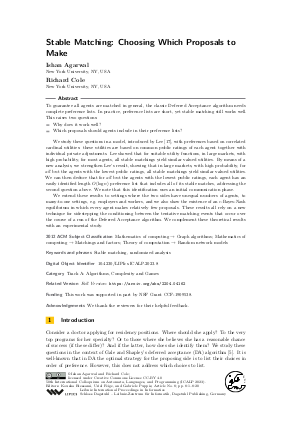@InProceedings{agarwal_et_al:LIPIcs.ICALP.2023.8,
author = {Agarwal, Ishan and Cole, Richard},
title = {{Stable Matching: Choosing Which Proposals to Make}},
booktitle = {50th International Colloquium on Automata, Languages, and Programming (ICALP 2023)},
pages = {8:1--8:20},
series = {Leibniz International Proceedings in Informatics (LIPIcs)},
ISBN = {978-3-95977-278-5},
ISSN = {1868-8969},
year = {2023},
volume = {261},
editor = {Etessami, Kousha and Feige, Uriel and Puppis, Gabriele},
publisher = {Schloss Dagstuhl -- Leibniz-Zentrum f{\"u}r Informatik},
address = {Dagstuhl, Germany},
URL = {https://drops.dagstuhl.de/entities/document/10.4230/LIPIcs.ICALP.2023.8},
URN = {urn:nbn:de:0030-drops-180603},
doi = {10.4230/LIPIcs.ICALP.2023.8},
annote = {Keywords: Stable matching, randomized analysis}
}

 Creative Commons Attribution 4.0 International license
Creative Commons Attribution 4.0 International license










